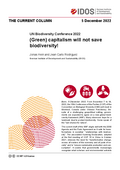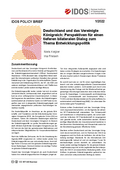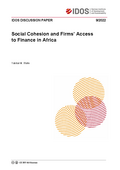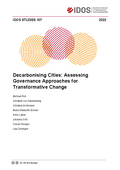-

Publications
Photo: www.shutterstock.com/de/image-photo/pont-du-gard-old-roman-aqueduct-45688924
Publications
The German Institute of Development and Sustainability (IDOS) publishes four independent publication series. IDOS researchers publish their current research results in Discussion Papers, Policy Briefs and Studies. Visiting scholars and cooperation partners also have the opportunity to publish their research results in one of the IDOS series. Publications from the series Analysen und Stellungnahmen, Briefing Paper and Two-Pager / Zweiseiter, which will be discontinued in 2022, will continue to be available online. The fourth publication series is for opinion pieces: The Current Column regularly comments on the latest developments and issues in international development policy.
IDOS researchers also regularly publish their research results in peer-reviewed and non-peer-reviewed German and international journals and publication series of other research institutes and institutions as well as with renowned book publishers. In addition, they use blogs and online platforms of partner institutions to communicate the Institute's research and advisory activities to an interested public.
Found 9409 results in 9 milliseconds. Displaying results 7061 to 7070 of 9409.
-
China’s impact on the global wind power industry
-
Sustainability certification in the Indonesian palm oil sector: benefits and challenges for smallholders
-
Evaluación del “Fondo de planificación estratégica e implementación de reformas autofinanciadas en Chile”
-
With or without force? European public opinion on democracy promotion
-
Zhongguo-jianzhu-jieneng: zhengce, zhang’ai he jiyu (中国建筑节能:政策、障碍和机遇)
-
Is the Earth flat or is it a cube? European foreign aid, political conditionality and democracy
-
Verfügbarkeit von Handelsfinanzierung: Herausforderung für Global Economic Governance
-
Ist die Erde eine Scheibe oder ein Würfel? Politische Konditionalität, Entwicklungshilfe und Demokratie
-
Post 2015: wie sollten Ziele für (inter)nationale Politik entworfen werden?
-
Post-2015: how to design goals for (inter)national action?















